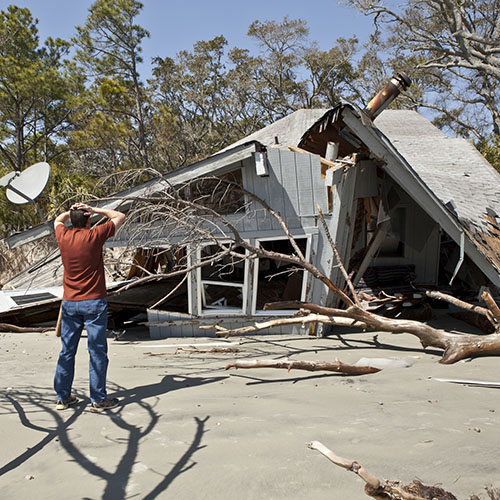How to Prepare for a Natural Disaster

Can birds predict severe weather?
Scientists around the world have been studying this question, along with the seismological abilities of animals like horses and snakes. Experts hypothesize that animal movements, alongside other tools, can help warn us of natural disasters. Animal tracking could provide vulnerable communities with enough time to evacuate before an earthquake, storm, or wildfire.
Of course, waiting for wildlife to warn you of severe weather is waiting too long. Despite advanced technology, we can’t always predict the next natural disaster. So, preparing well in advance is essential to reduce your chance of loss.
-
Make a Plan
Create an emergency plan for shelter, communication, and potential evacuation. Make sure everyone is aware of the plan and knows where the emergency supplies are stored. If your home has a fire escape, train all family members in its use before a situation arises. -
Stock Up
Store enough water and nonperishable food to last at least three days. A good rule of thumb is one gallon of safe drinking water per person (and pet) per day. Ensure that you have enough of the essentials, including medications. -
Know Where Your Pets Will Go
If it’s not safe for you, it’s not safe for your pet. Don’t leave them behind! Before the storm, choose a “Designated Caregiver” in case you need to evacuate to somewhere that is not pet–friendly. Maintain a pet-specific emergency kit with food, disinfectants, blankets, and other essentials. -
Protect Important Documents
In a safe location, assemble important documents such as copies of insurance policies, your family’s and pets’ health records, and identification. Keep these documents in a waterproof emergency kit. -
Prepare Your Home
Trim or remove damaged trees before hurricane season. Reinforce windows, exterior doors, and garage doors, and keep rain gutters clear and secure. -
Receive Severe Weather Warning Notifications
Keep your phone charged as often as possible and heed any warnings that come in. Use the Storm Prediction Center or National Weather Service to track severe weather. Follow official recommendations against traveling during severe weather. -
Insure Your Property
Homeowners, condo, and renters insurance provide coverage for damage from fire, fallen trees, and other hazards. If you live in a flood–prone area, you will need a separate flood insurance policy.
Your dog may not be able to predict a natural disaster. But you can keep your family and property safe with effective emergency preparedness.



